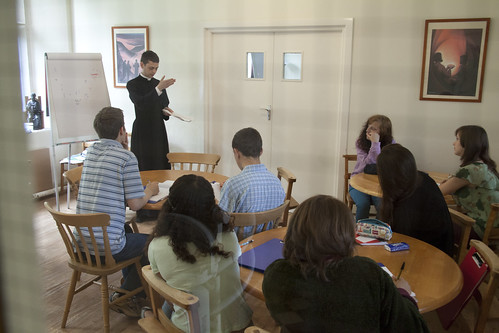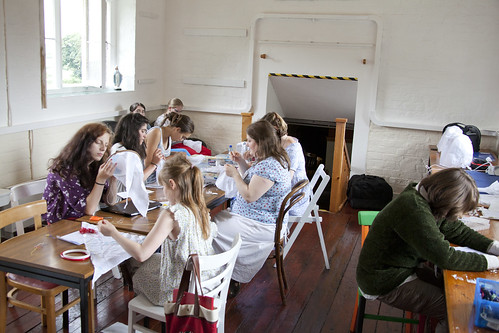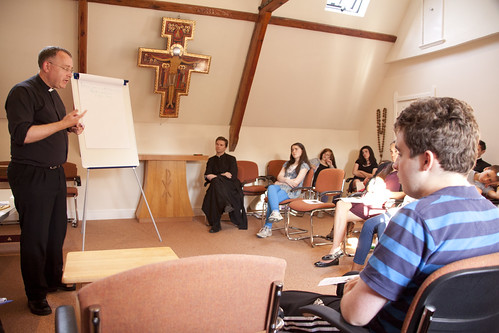
I encourage readers of this blog who see the Catholic Herald over the weekend to have a look at the feature on Catholic education, which is composed of four short pieces by different people, one of whom is me. My contribution was about the motivations of those who educate their children at home.
The other three pieces are by Philip Booth of the Institute of Economic Affairs, Kevin Meagher of Labour Uncut, and Ella Leonard of PACT Educational Schools, the trust which runs the Opus Dei schools.
Ella Leonard makes a general point:
'We need to be confident that Catholic schools have the answers because of of our understanding of the whole human being as God's creation, but we need to regain our confidence and re-evangelise. Understanding that education can never be neutral, our schools need to provide an envionment in which students are enabled to build and deepen their relationship with God.'
Kevin Meagher is more direct:
'How do you go through a Catholic education and end up spouting New Age claptrap?'
He concludes: 'Ultimately, if our schools aren't in the business of turning our committed young Catholics, then, really, what is the point of Catholic education?'
It is amusing think of the horror that sentence will produce among Catholic education professionals up and down the land.

Philip Booth focuses on the public policy aspect of the problem. His opening paragraph reveals what the Catholic educational establishment think is the answer to Meagher's rheorical question.
The bishops' 2007 joint pastoral letter on education said: "For a very long time now, the Catholic Church has been an important partner with public authorities in the provision of education." This perspective, which sees education as something which is handed down to parents through a partnership of bureaucracies, needs revising.
All place great emphasis on the role of parents. In a sense I do so more than anyone, because home education is the ultimate parent-led approach to education. One does have to recognise, of course, that while all parents would be delighted to have more educational choice, and almost all of them value academic excellence and a disciplined, spiritual atmosphere, attempts to make schools more visibly Catholic, just like attempts to make parishes more visibly Catholic, will be opposed by some parents. And not only opposed: what happens at home, and what children bring to school with them, can completely undermine attempts to create a Catholic ethos.
There is a parallel I suppose with the Reform of the Reform: the task of a good Catholic head teacher coming into a school is similar to the task of an new, orthodox parish priest: to persevere with what he knows is right despite certain howls of protest. It's not a task I envy them.
Photos: of the St Catherine's Trust Summer School last year. This year the dates will be Sunday 27th July to Sunday 3rd August, for ages 11 to 18. Download an application form.

The very word 'provision' when applied to education puts the task on the same flooding as provision of roads, electricity, gas, sewage - which from the point of view of a public official, it probably is.
ReplyDeleteNow what if Their Lordships turned our existing schools into establishments that empowered parents to become the "the first and foremost teachers of the child".
ReplyDeleteThe problem we are going to face if we keep on the existing route of Church/State partnership is the State will force the Church to do what it should not do.
We must get Catholic education of children back where it belongs, in the hands of parents, and in sound Catholic school and parish education.
ReplyDeleteThe latter means formal catechism and then apologetics. By the age of twelve I and my classmates were familiar with most of the “penny catechism” now available as “A Catechism of Christian Doctrine” from the CTS. By the age of seventeen, we were familiar with the basics of Catholic Apologetics.
I have been told that this s too much for modern children. Rubbish. Is there any evidence that children are less intelligent today? I think not.
However, it may be too much for the post- Vat II generation of so called “Catholic” RE teachers, and I suspect there is the rub. Judging by the various posters up in my parish, Catholic RE for children is still stuck firmly the world of the “Church of Nice”
The Holy Father has dealt very specifically with these issues in a Vatican Radio broadcast today and made his views very clear. It is now up to our bishops, in addition to their no-doubt very important and very PC projects on social justice etc, to address them seriously to Catholic Education.
This comment has been removed by the author.
ReplyDeleteThis comment has been removed by the author.
ReplyDeleteThis comment has been removed by the author.
ReplyDeleteThanks for drawing attention to this. As an Assistant Head of a Catholic school (secondary, independent, all-girls), I have an interest, and would like to comment on three points.
ReplyDeleteFirst, most of the writers made some mention of secularisation in Catholic schools. I have yet to meet a Catholic school which does not give a central position to faith, and those which fail to do so should be held to account. But schools tend to put more emphasis on ethos, which can be consistent with secular values, rather than doctrine, which is sometimes at odds with them.
It’s inevitable that Catholic schools embrace the secular world to an extent, bearing in mind that (a) most have a proportion (in some independent schools, a majority) of non-Catholic students who are to be welcomed, included and respected, and (b) through outreach and community work, schools are very much in and of the secular world; I welcome this because it allows us to show that we are are not, as some think, a narrow-minded enclave, but rather that we are open-minded institutions, confident in our faith yet appreciative of the values can be learned from others, and which make a valuable contribution to society. I agree that we should be wary of a faith education so ‘lite’ that it is reduced to values without spiritual context, but a good way to prepare young people to be accepted and accepting in a world whose views are ‘often inimical to ours’ is to enable them first to understand a variety of viewpoints; not to do so might exaggerate a divide between faith and non-faith communities.
Secondly, two writers spoke of ‘bleak uniformity’ and ‘rote learning’ of popular, secular views. I agree that this is detrimental to a good education, but it’s not enough to ‘avoid pressurising children to accept relativistic norms’; we should be avoiding pressure of any sort. Meagher talks of ‘giving’ [students] ‘the … arguments needed to defend their faith’. Rather than giving them the arguments, which looks at best like spoon feeding and at worst like indoctrination, why not go further and give children with the freedom to discuss respectfully and reach their own reasoned opinions, guided by their sense of conscience and compassion? There was little notion in any piece that children should take ownership of their spiritual formation. This is something my school takes pride in: we value highly the girls’ role in the spiritual and moral life of the school, whether through leading fundraising initiatives, assisting at Mass as servers, musicians, readers, or writing prayers for school liturgies. That girls are encouraged to take a leading role in spiritual life is an encouraging sign in a church which still has work to do in developing a place for women to take the lead.
Lastly, there was very little mention of service, though this is something faith schools tend to excel in. Alumni of Catholic schools show a well developed sense of responsibility to the wider community, often following careers which don’t merely feed personal ambition but encourage the young to aspire to make a difference in their world, to strive towards social justice or to work for charitable organisations. At my school even scholarships are more than an accolade or crude recruiting tool; rather, they confer the responsibility to serve the community.
Sorry it’s a long post. I appreciate that much of this may not find favour with traditionalists, but these thoughts might help explain how some of us inside Catholic schools feel about our role.
Friday 21st March. Joseph Shaw. Congratulations to Bishop McMahon
ReplyDeleteFriday 11th April. Joseph Shaw
What's wrong with Catholic Education?
Dare I suggest that the two are very very connected.
Charlotte Goddard. I do not know what happens in your school.
ReplyDeleteI know that at my sons' school, in no particular order
(1)there are IVF posters prepared by Yr7s decorating the notice boards in the Science Block,
(2) the children are encouraged to access an organisation called connexions for help and advice. Search connexions on the Internet and see how long it takes to find a link to Brook "Pregnancy" Advice. It took me 15 seconds.
(3) they recently had a "diversity day" which included a video of a talk given by President Obama to some American children explaining why "Same Sex Marriage" is good.
Oh yes. This is a "Catholic" School.
James, I'm not aware of any of these at my school.
ReplyDeleteBut I don't think there's anything fundamentally wrong with exposing children to any of the matters you raise; they will want to find out about them anyway. The important thing is to raise them within an ethical context (even if they are part of the Biology rather than the RE curriculum), where children can learn to appreciate the complexity and nuances of these sensitive subjects and not to be judgemental.
The posters, the website, the video probably only give part of the picture. What matters is the quality of debate when these and other similar matters are raised in class, and that the children are taught to understand how these questions are relevant to their Christian life.
What else could schools do? To stay silent on controversial topics or to tell the children what to think would be educational neglect, I think.
They were told "the Catholic Church says that Same Sex Marriage is wrong, but we should be in favour of it as it's only fair". Then the video of Obama. The posters were "produce a poster on the benefits of IVF". I can assure you that the opposite is not taught. Certainly not by the unmarried RE teacher who is currently off on Maternity Leave. The "diversity day" was run by teachers from State Schools.
ReplyDeleteMs Goddard says that the school should not tell the children what to think. I would have thought that this is only partly true. Certainly, an important role of a good education is to teach children how to reason, think and argue, but another must be to inculcate values (e.g. respect for others, honesty, generosity, etc.), and that must include Catholic values. As Catholics, we believe certain things and the children have a right to be taught those things (and parents have a right to have their children educated in accordance with their wishes, which presumably includes being taught the Catholic faith). We believe in God, Jesus, His death and Resurrection, our vocation to lead holy lives to get to Heaven, and so forth - the children need to know all that. We also believe that that, for example, IVF is wrong, same-sex "marriage" is wrong, lying is wrong, love is good, marriage is good, going to Mass every Sunday is good (and obligatory), God forgives our sins when we confess in Confession, etc., etc. Children in Catholic schools should be taught all these things, and taught *why* the Church teaches as she does. No doubt this will lead to questioning and discussion (or it should do) and that is a very good thing - the children will be learning how to reason, argue and think, while at the same time developing their moral and spiritual selves, and will be given the means by which they can lead good lives and attain salvation in Heaven.
ReplyDeleteCharlotte: your point can be answered in two ways.
ReplyDeleteFirst, the children can't have a debate about Catholicism without understanding it. They won't, unless a lot of time has been put into this from an early age. However wonderful your own school, I doubt they come to you properly catechised for their age. So you need to put some serious hours into conveying information.
Second, you don't call this 'indoctrination' in other subjects. You don't have a free-wheeling debate about the times table or how Latin nouns decline. You just teach it. And this applies to morality too, when you take it seriously: the obligation not to bully ethnic minority pupils, for example. I seriously doubt racist views get a lot of favourable band-width in classroom discussions. Why not? You think those views are not worthy of consideration, except to condemn them. Killing children in the womb? Oh that's another matter!
Do you see what's happened here? You've taken your standards of what's important, and what controversial, from secular society instead of from the Church. It's understandable. But it explains why we might hesitate to describe your school as Catholic.
Secular society doesn't even *claim* to be infallible. There's quite an irony there.